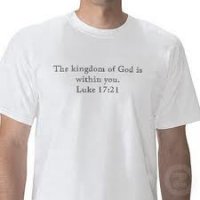|
BACKGROUND
DEFINITION OF TERMS (For Serious Students)
COVENANT
LAW
LAW
I. In the Old Testament
II. In the New Testament
GRACE
GRACE, MEANS OF
KINGDOM OF GOD
KINGDOM OF GOD, KINGDOM OF HEAVEN
I. In John the Baptist
II. In the teaching of Jesus
III. Kingdom and church
IV. In the rest of the New Testament
V. In theological thought
The
full background to this teaching is available online at this link
<b>DEFINITION OF TERMS</b> (For Serious Students)
|
Online links to scriptures (New International Version [NIV] unless otherwise stated) are shown in blue
| SALVATION - ENTERING THE KINGDOM |
|
___________THE THREE KINGDOM AGES__________
THEME______PATRIARCHS__PROPHETS___PEOPLE___
_______________Creation_____c.1500BC______c.5BC___
_______________c.1800BC_____c.432BC___Jesus Return
SOCIETY_______Nomadic_____Agrarian___Developmental
REACHING_______Family_______Nation________World
SALVATION__Righteousness___Law________Grace
|
| REIGN OF RIGHTEOUSNESS |
|
 From creation through to the end of the Patriarchs, personal righteousness was the characteristic that gained God's favour. There was no formal religion. God sought out and rewarded those who had a heart for Him, proven by righteous living.
|
|
|
 1. CREATION
Adam and Eve were the founder members of the world's first family. They were the created by God. In the good times, before the fall, Adam, Eve and God fellowshipped together, personally and intimately.
Genesis 3:8
|
|
|
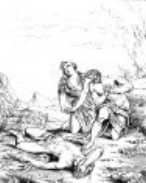 After the fall, their family was beset by all too common jealousies amongst their siblings. The first one though, was as serious as they can get. Resulting in murder!
Genesis 4:8
The first righteous line was snuffed out by satan almost as soon as it started! But Adam and Eve went on to have other children and the population increased.
|
|
|
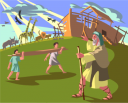 2. NOAH
All did not go well and God got fed up with the sin of the people.
Genesis 6:6-7
|
|
|
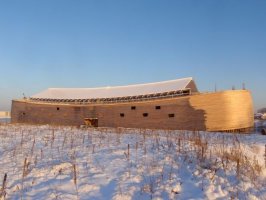 Except for Noah, who was living a righteous (although not perfect) life.
Genesis 6:8-9
|
|
|
 Noah and his family were saved through Noah's righteousness.
Genesis 7:1
|
|
|
 3. THE PATRIARCHS
The next major character we come to is Abraham, who again found favour with God through his righteous living.
Genesis 15:6
|
|
|
 God persisted with the succeeding generations. Some that were less than righteous, but God trained them as they went, all because of His promise to Abraham. Jacob was a classic example, resulting in a name change from supplanter to, effectively, 'chosen one'. (David's translation)
Genesis 32:28-30
Yes, the first kingdom age was based upon personal righteousness.
|
| RULE OF LAW |
|
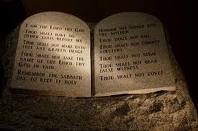 The first nation state of Israel was based on the Law given to Moses on Mount Sinai, shortly after the Jews escaped from Egypt. Today's State of Israel is still based on 'law', although not entirely God's Law! That day is promised to come. Another story for another time!
We will join Moses and the people in the Sinai Desert.
Exodus 19:1-6
|
|
|
 The people needed to keep the Law that Moses was about to be given in order to receive God's covenantal promises. Obedience is a requirement of all the Covenants, including ours today.
Moses was first given the 10 Commandments, the law in outline.
Exodus 20:1-17
|
|
|
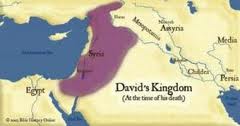 The remainder of the Old Testament is largely about the people's efforts in keeping, or not keeping, 'The Law'. Benefits were received for obedience, highlighted by the occupation of the Promised Land. And the ultimate consequence of disobedience was the eventual loss of the same.
The kingdom prospered under the leadership of the obedient King David.
Acts 13:21-2
|
|
|
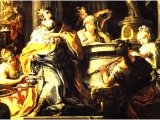 But during and after the reign of David's son Solomon, disobedience and rebellion appeared and spread until finally, the Promised Land was lost to the Assyrians and Babylonians.
Jeremiah 16:10-13
|
|
|
The Law proved impossible to keep. For it wasn't enough to simply enough know the Law. It had to be obeyed.
Romans 2:13
|
|
|
The Jews found the Law impossible to keep all the time, and paid the cost. The Land was lost.
Romans 2:25
A new way was needed to inherit the kingdom. The third kingdom age was about to begin.
|
| AGE OF GRACE |
|
 Jesus came with a new way. This caused huge problems for the Jews, who were used to the kingdom of The Law.
But Paul explained the 'new' concept of 'grace' to them.
Romans 11:1-6
|
|
|
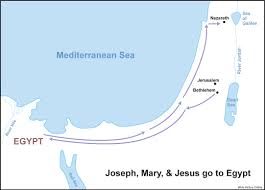 The change from Law to grace is indirectly beautifully described after Joseph and Mary returned home, having fulfilled their obligations under the Law to have Jesus circumcised. The grace of God was upon Him.
Luke 2:39-40
|
|
|
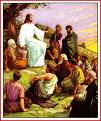 Interestingly, Jesus never mentioned the word 'grace' in the gospel accounts of His life. But John described it in the introduction to his gospel.
John 1:14-18
|
|
|
 Paul too, confirmed the change from the Age of Law to the Age of Grace.
Romans 3:21-30
|
|
|
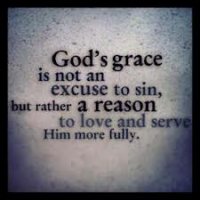 Paul states that God's grace in sending Jesus to die, as a substitute for our sinfulness, is not an excuse for disobeying the Law, as many today would like to believe.
1 Corinthians 6:9-11
|
|
|
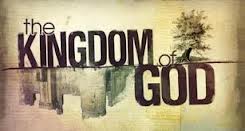 In this Age of Grace, the 'rules' for entering the kingdom have been turned upside down.
Matthew 18:1-4
|
|
|
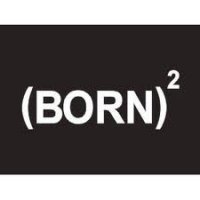 The first qualification to enter is to be 'born again'.
John 1:3-6
|
|
|
 This is to give us the desire to live a holy life, through God's grace.
2 Timothy 1:8-10
|
|
|
 The Age of Grace has a finite end. At the end of the current 'Age of the Gentiles', God will also extend His grace to the Jews.
Romans 11:25-27
We are a blessed people to live in the Age of Grace. May we not abuse our blessing!
|
| NEXT WEEK: REVELATION OF....... 3 KINGDOM AGES: KINGDOM PRIESTHOODS |
|
 It is important to understand that Jesus didn't 'just appear' but was the final fulfillment of God's eternal plan.
|
| A NOTE FROM DAVID |
|
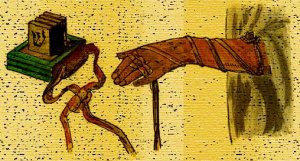 Living in the Age of Grace is a tremendous privilege which many Christians, and others, abuse. For it is still our call to live holy and righteous lives and fulfil the Law.
Of course, when we fail, we have the wonderful gift of grace to fall back on. what an amazing time to live in!
PHYLACTERIES
Phylacteries (tephillin). These are strips of leather to which is attached little square box made of parchment and painted black. The box contains four parts of the Torah written on parchment: Exodus 13:1 and 11:6; Deuteronomy 6:4-9; 11:13-21. According to Deut 6:4-9 two phylacteries were used, one for the head and one for the arm. These (called frontlets in Deuteronomy) were put on in such a way that one box rested on the head, between the eyes (seat of the mind) and the other on the left arm opposite the heart (seat of the actions and the emotions, denoting that one loves the Lord with one's heart). They are referred to as phylacteries in the New Testament (Mat 23:5).
Source: http://www.bible-history.com
|
So until next week.......
MAY GOD BLESS YOU AND YOU BLESS GOD!
His servant and yours

Learn more about us at...
www.wwj.org.nz/about.php
|
A DAVID'S DOODLING
37. We know in life, that all good things come to an end. How is it then, that we continue to believe that the current age of God’s grace and mercy will go on forever?
David Tait
|
Check
out the WWJ website for….
More David's Doodlings: www.wwj.org.nz/dd.php
PGIM! Weekly Encouragement Ezine�: http://www.wwj.org.nz/wwword.php
Reports on past Ministry visits: http://www.wwj.org.nz/diary.php
Eagles Fly High!: http://www.wwj.org.nz/eagle.php
Eagles Fly High! (Pastors, Teachers and Students): http://www.wwj.org.nz/eaglepts.php
|



















